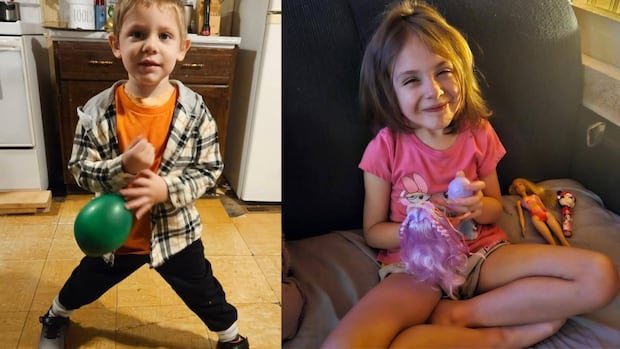Cadaver dogs are set to search for two missing children in rural Nova Scotia, who disappeared over four months ago. The RCMP state they do not have evidence suggesting Lilly and Jack Sullivan are deceased.
Lilly, aged 6, and Jack, aged 4, were reported missing on May 2 after their mother called 911, reporting they had wandered away from their home in Lansdowne Station, a sparsely populated area in Pictou County, around 140 kilometers northeast of Halifax.
Following their disappearance, an extensive search covering 8.5 square kilometers of dense woods involved approximately 160 volunteers, service dogs, drones, and helicopters, but cadaver dogs specialized in detecting human remains were not utilized during the initial search.
Police announced that planned searches for the children are forthcoming but did not disclose specific details for safety reasons, clarifying that the searches will not occur over the weekend.
During a media briefing, Cpl. Guillaume Tremblay mentioned that the investigation has explored various avenues, including ground searches, following up on over 800 tips, and reviewing over 8,000 videos. Deploying cadaver dogs marks the next phase of the inquiry.
While emphasizing that there is no concrete evidence of the children’s demise, Tremblay stressed the importance of exploring all investigative possibilities. The children’s paternal grandmother, Belynda Gray, expressed relief that cadaver dogs are being employed but voiced concerns about the slow progress of the investigation and the limited information provided by authorities.
Sgt. Stephen Pike highlighted the specialized training of cadaver dogs, emphasizing their ability to detect the distinct odor of decomposition. Two dog teams from British Columbia, led by Sgt. Dave Whalen and Insp. Luke Rettie, will conduct the upcoming searches.
Cadaver dogs are typically employed when there are indications of decomposition and other scenarios, such as the individual wandering off, have been ruled out. The success of these dogs hinges on the presence and release of odor, and they can detect scents underwater and underground.
In late August, RCMP indicated that any searches for human remains would be guided by information gathered during the ongoing investigation, including forensic evidence collected from the search area. Recent court documents suggested investigators did not suspect criminal involvement in the case by mid-July.
The deployment of cadaver dogs signifies a critical juncture in the search for Lilly and Jack Sullivan, as authorities continue to pursue all avenues in the quest for answers surrounding the children’s disappearance.

